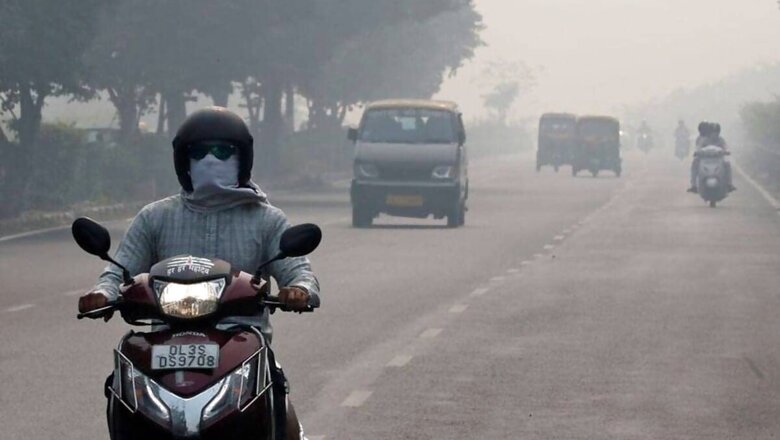
views
Days after it informed the Supreme Court that it was planning to bring out a new legislation to tackle the problem of air pollution in the Delhi-National Capital Region (NCR), the Centre on Thursday issued an ordinance for the setting up of a commission for ‘Air Quality Management’ in the region.
The new law vests overarching powers with the commission to monitor, regulate, and take penal action in matters pertaining to air pollution for the Delhi-NCR and adjoining areas, including Punjab. The decisions of this commission will prevail in cases where there are conflicts with orders that are passed by state governments located in this region.
Examples of the overarching power of the commission include ordering the closure of polluting activities or industries, taking suo motu cognisance of issues, and filing of complaints before a magistrate. The ordinance also states that any violation of the new law shall be punishable either with a jail term of up to five years or a fine of up to one crore rupees or both.
The commission will consist of 18 members out of which 12 will be sitting and former bureaucrats. The remaining will be made up of technical experts and non-governmental experts.
‘Bureaucratic Vessel, Not Very Different from EPCA’
The quick introduction and overall structure of the commission though, has not inspired confidence among environmental experts, lawyers, and activists. The new law as well as the commission, many believe, are a missed opportunity to move towards a more holistic, air-shed management approach. For long, scientists and environmental experts have argued that since the entire region is affected by similar pollution and meteorological factors, a common approach was imperative. However, they were less than enthused by the new legislation.
“Air pollution is more than a NCR problem. The Commission is a lost opportunity to explicitly set the ground rules for an air-shed based approach – one that could have been deployed in polluted areas across the country,” said Navroz Dubash, Professor, Centre for Policy Research & Lead Coordinating Author, Intergovernmental Panel on Climate Change.
The new commission, Dubash said, is a bureaucratic vessel whose effects will depend on its contents and how the pot is stirred. “The fact that it was created practically overnight, with no discussion and input, does not inspire confidence that it will open the doors to a more fruitful conversation and action across all interests. The lack of clear benchmarks of progress and interim signposts is disappointing,” he added.
Environmental lawyers were critical of the similarities of the new commission to the Environment Pollution (Prevention and Control) Authority (EPCA) which it will replace.
The ordinance brought down curtains on EPCA, a statutory authority that has been in existence since January 1998. The introduction of Compressed Natural Gas (CNG) fuel in Delhi-NCR was one of the most crucial reforms introduced through EPCA and the Supreme Court. EPCA’s recommendations and reports to the Supreme Court also led to the roll-out of Bharat Stage-VI emission standards and banning of pet coke.
However, EPCA has been criticised over the last years over its lack of strict action against polluters in NCR, despite having the requisite powers. “The commission aims to replace all other committees and ad hoc bodies dealing with pollution. However, in reality, there is only one committee that the new body will replace, which is EPCA,” said Ritwick Dutta, an environmental lawyer.
Dutta said that the powers given to the commission are similar to the ones conferred on EPCA. “The ordinance gives powers to entertain complaints. Such powers already existed with EPCA, but they were never exercised. The same is likely to continue with the new commission. The reason is simple. A complaint has to be filed before the judicial magistrate first class. Given the fact that a majority of members of the commission are serving government servants, it would amount to filing cases against themselves,” Dutta added.
While the ordinance allows the appointment of members from Ministry of Power, Ministry of Agriculture, Ministry of Housing and Urban Affairs, Ministry of Road Transport and Highways and Ministry of Petroleum and Natural Gas, it has no mention of appointing members from Health Ministry, Labour Ministry and Ministry of Rural Development, Duta pointed out.
Environmental lawyer Sanjay Upadhyay said that the commission could have been brought at par with National Green Tribunal (NGT), however, the ordinance puts it under NGT. The ordinance states that the commission’s orders, directions or actions can be appealed only before the NGT and not before any civil court.
“One expected that the commission would have been pitched a bit higher than what EPCA was or even the NGT. However, this ordinance puts everything under the NGT. So the level of this commission is below the NGT,” said Upadhyay.
“The law also does not appear to take strength from either the Environment Protection Act or the Air Act, which already exist. Having said that, it is important that the areas outside NCR are also brought under its ambit,” Upadhyay added.
EPCA welcomes Commission
The government’s new ordinance was welcomed by Bhure Lal, chairman, EPCA and Sunita Narain, member, EPCA, and Director General, Centre for Science and Environment. In a letter to Environment Minister Prakash Javadekar, they said that the new ordinance shows the intent and determination of the Union government to mitigate toxic pollution in the region. They detailed the important actions taken on the basis of EPCA’s recommendation in their letter.
The duo also said that the fourth-generation reforms on air pollution needed deliberation and implementation for cleaner air. “That will necessitate massive augmentation of intra-city public transport and to move industries, power plants and other users away from polluting fuels like coal to natural gas, electricity and renewables to ensure clean combustion,” their letter stated.
Read all the Latest News and Breaking News here



















Comments
0 comment